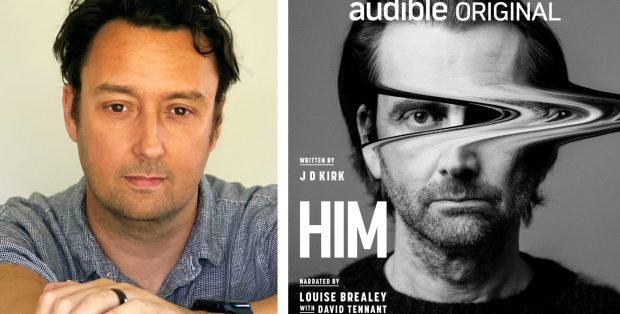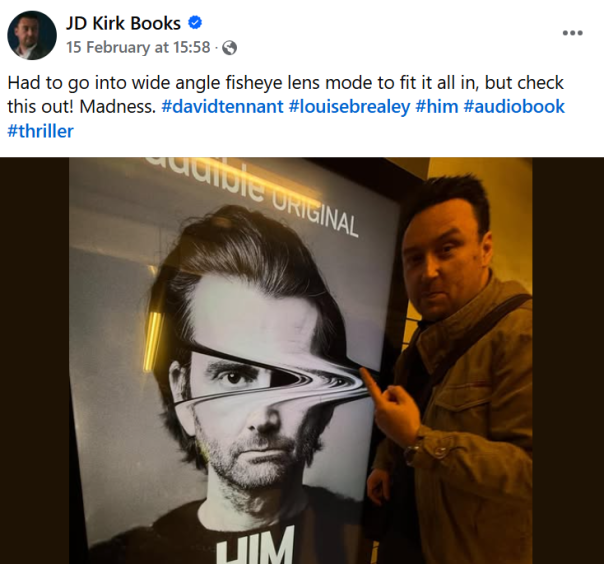
It’s a question often pondered: where do we go when we die?
There are, of course, many schools of thought, but in today’s tech-driven world, there could be a new answer – all our data gets put through artificial intelligence (AI) and we become digitally immortal.
Grief tech, as it is known, has developed into a multi-billion-pound business worldwide but research is yet to be done on the impact it has on the grieving process.
Californian James Vlahos founded HereafterAI after spending hours with his terminally ill father recording his life story and building a chatbot that could answer questions in his dad’s voice.
In China, for the equivalent of just a few pounds, people can create a digital avatar of lost loved ones. An avatar of SenseTime’s founder even addressed the company’s annual general meeting months after his death.
Exploring ‘grief tech’
Grief tech is the subject at the centre of the latest audiobook from JD Kirk, the pen name of Fort William author Barry Hutchison.
Narrated by big-name stars David Tennant and Louise Brealey, psychological thriller HIM sees Sarah lose her husband, Nick.
She turns to experimental software developed by his best friend called EternaLife, which reconstructs the personality and voice of the dead using their data.
Soon Sarah finds herself talking to an eerily realistic simulation of her late husband. At first, Nick 2.0 is comforting, but strange things begin to happen and someone is using the tech to manipulate her grief.
The idea for the story came from JD’s fascination with the rise of AI technology, and seeing an advert for an app in which you could bring people to “life” from prompts and data.
“I thought that was an interesting concept,” he said. “Then I saw one of the most harrowing things I’ve ever seen. It was a video from Japan where a woman’s daughter had died, and they brought her back in virtual reality as a lifelike 3D model.
“She was utterly devastated and broken, trying to hold on to this child who wasn’t really there, trying to grab for it.”
JD said the emerging trend raises the possibility of living, in a sense, forever. “The idea of the app in the book is essentially digital immortality,” JD said.
“Of course, it’s not that because it’s not that person. That person is gone and I don’t think you can ever heal from that if you keep a replica around. Grief tech seems to be a genuine, growing thing now. People are trying to develop it in more and more detail. Who knows where it all ends up?”
While the sci-fi scenario of AI deciding humans are inferior and taking over is, many experts say, unrealistic, the novel is a stark reminder of the importance of responsible control of such technology. Rather than AI itself being the villain of the piece, it’s the tool used by an abusive man.
“It can be useful and can be abused, like any other thing on the planet, like guns are used for keeping people safe, but also for committing crimes,” JD said. “AI is a tool and how we use it is going to determine what the next few years look like.”
AI’s impact on creative sector
JD, who is behind the bestselling DCI Logan books, also has a film in post production called DRAGN, about a killer drone powered by AI, and he’s found the technology ripe ground for storytelling.
Writing about it, he jokes, might put him first on the hit list if it ever stages a Terminator-like takeover, but there are more real and pressing concerns.
“A few years ago, the thinking was that robots would clean toilets, lift heavy things and drive around and we’d all get to be artists, poets, authors and have a lovely time,” JD said. “But copywriters are losing work left, right and centre. In creative industries, people’s jobs seems to be more at risk. Are we going to end up doing all the manual labour while AI does the thinking for us?
“Right now, the books AI writes are largely terrible, but what happens in five years? Will bookstores offer the option to go: ‘I want a story about a ninja detective and a space rabbit’ and it writes a custom book made to your tastes?”
JD Kirk’s inspiration
JD was set on a path to becoming a writer after a librarian where he grew up in Caol, near Fort William, inspired him to read and then write books.
She even put a “terrible” short story he’d written on the shelf. He’s gone on to write more than 140 books for children under his own name and many more under JD Kirk.
But, from what he’s seen at school events, he fears today’s generation is losing a creative spark because of a missing component in modern living – boredom. “Since the iPad generation dawned, there’s a huge difference,” he said.
“When I first started in 2008, they’d have loads of ideas. By 2018 it’s like getting blood out of a stone. It’s like their imagination is numbed by YouTube and TikTok.
“One of the greatest gifts we have as human beings is the possibility to be bored, because that’s when we’re creative. Now we don’t have the opportunity – we have a device with access to everything in the world in our pockets. When I was growing up in Fort William, we didn’t have a cinema and I used to see adverts for movies I knew I wouldn’t get to see until they came to TV.
“I’d write my own version based on the trailer, to the extent that when I finally saw the real ET, I was confused where all the ninjas were because there were loads in mine!
“Now I have to make a conscious effort to be creative rather than it just automatically happening.”

The creativity certainly came for HIM, which marked a departure in style from JD’s usual crime writing. He’s been delighted with the response to the Audible Original, which dropped as a surprise to fans.
“First I thought it must be a wind-up, another David Tennant that makes a living narrating audiobooks. But no, it’s the real David,” he said, adding: “I’m a massive fan of Louise – she was in Such Brave Girls, which I think is one of my favourite comedies of all time. She’s the main narrator and brings the characters to life brilliantly.”
HIM by JD Kirk is available on Audible now

Enjoy the convenience of having The Sunday Post delivered as a digital ePaper straight to your smartphone, tablet or computer.
Subscribe for only £5.49 a month and enjoy all the benefits of the printed paper as a digital replica.
Subscribe © Shutterstock / Ground Picture
© Shutterstock / Ground Picture